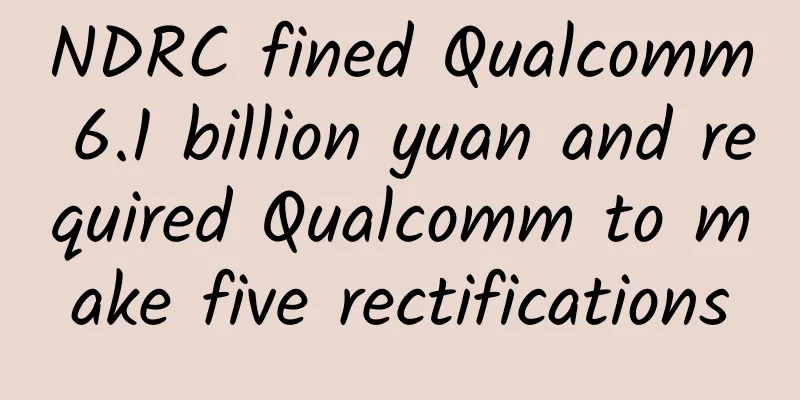NDRC fined Qualcomm 6.1 billion yuan and required Qualcomm to make five rectifications

|
Fine of 6.1 billion yuan In the early morning of February 10th, Beijing time, China's National Development and Reform Commission (hereinafter referred to as "NDRC") announced a fine of RMB 6.088 billion on Qualcomm and set rates for smartphone manufacturers to license its technology, thus ending the investigation that threatened Qualcomm's growth in the Chinese market. Qualcomm said in a statement on Monday that the NDRC had ruled that the company had violated China's antitrust law and that it had not challenged the ruling. The statement said Qualcomm was fined 6.088 billion yuan (about $975 million). In addition, the NDRC also set terms for royalties for Chinese mobile phone manufacturers to use Qualcomm's chip designs. The deal settles a more than year-long investigation that had hurt Qualcomm’s ability to collect royalties in China, with some phone makers delaying or underpaying them. Qualcomm makes most of its profits by licensing basic technologies critical to mobile phone systems to phone makers. Qualcomm said it would offer 3G and 4G basic technology patents for licenses as a concession to Chinese authorities and no longer require that the use of those patents be tied to the company's other patents. Qualcomm will charge Chinese mobile phone manufacturers for patent licensing at rates similar to those in other parts of the world, alleviating market concerns that the company might be forced to offer discounts to settle investigations. While the royalty rates are similar in percentage terms, the value of the phone, which is the basis for billing, will be assessed at 65% of the total price of the device. "This rate is consistent with what we charge globally," said Qualcomm President Derek Aberle. Qualcomm shares rose in after-hours trading in New York following the news. As of the end of the last fiscal quarter, Qualcomm held a total of $31.6 billion in cash and marketable securities. In this fiscal quarter, 74% of the company's revenue came from chip sales, but 58% of its operating profit came from licensing revenue. In the past five years, Qualcomm's total royalty income has reached more than $30 billion. Qualcomm said it now expects revenue of $26.3 billion to $28 billion in its current fiscal year ending in September, compared with its January 28 forecast of a minimum full-year revenue of $26 billion. Excluding certain one-time items, full-year earnings per share are expected to be $4.85 to $5.05, higher than the previous forecast of $4.75 to $5.05. In addition to Qualcomm, Microsoft and Symantec are also targets of Chinese government investigations, which has increased market concerns about whether China is using such investigations to support its own companies. The National Development and Reform Commission requires Qualcomm to make five rectificationsAccording to the administrative penalty decision, Qualcomm has a 100% market share in its CDMA WCDMA and LTE wireless communication standard essential patent portfolio; the market share of CDMA WCDMA and LTE wireless communication terminal baseband chips also exceeds 50%, which means it has an absolute market dominance. CDMA and WCDMA refer to the 3G standards used by China Unicom and China Telecom, while LTE is the 4G standard used by China Unicom, China Telecom and China Mobile. Qualcomm seized the advantage of its strong market dominance and began to abuse its market dominance. This is mainly manifested in: 1. Charging unfairly high patent licensing fees. 2. Bundling non-wireless standard essential patent licenses. 3. Imposing unreasonable conditions on the sale of baseband chips. In accordance with Article 47 and Article 49 of the Anti-Monopoly Law of the People's Republic of China, Qualcomm was ordered to stop abusing its dominant market position and was fined 8% of its sales revenue of RMB 76.102 billion in my country in 2013, totaling RMB 6.088 billion. Lu Yanchun, deputy director of the Price Supervision and Anti-monopoly Bureau of the National Development and Reform Commission, said in an interview with CCTV Finance: According to the law, Qualcomm must pay the fine to the central government within 15 days from the date of our formal punishment. Fines are a necessary way and means to correct illegal behavior, but it is not a fundamental purpose. The investigation and handling of this case shows that our country attaches great importance to intellectual property protection and firmly opposes any abuse of intellectual property rights to exclude or restrict competition. In addition, the rectification contents mainly include: 1. For mobile phones sold in my country, the patent fee will be changed from the price of the whole device to a patent license fee of 65% of the price of the whole device; 2. Provide patent lists to Chinese companies that purchase Qualcomm patent products and no longer charge licensing fees for expired patents; 3. No longer require Chinese mobile phone manufacturers to conduct free reverse licensing of their patents; 4. When licensing patents, non-wireless communication standard essential patents will no longer be bundled; 5. No unreasonable agreements are required when selling baseband chips. |
>>: Google Glass has failed? It seems too early to say
Recommend
Low budget user growth model!
"Growth hacking" must be familiar to th...
How to optimize old SEM accounts? How to optimize Baidu promotion account?
For friends who do bidding, many will encounter t...
Lanzhou clothing WeChat applet development, how to create WeChat applet in the clothing industry?
Our lives have become increasingly dependent on t...
The 120,000 yuan Camry put Toyota on the hot search, but pulled Japanese cars off the altar
Every manufacturer wants to be on the hot search....
Today's hot search made me cry...
"I want to transfer jobs." "Which ...
Where is the most beautiful ginkgo tree in China?
The ginkgo leaves are turning yellow, and autumn ...
Analysis of the planning process of "Learn Together" online course activities
Figure 1-Case analysis mind map 1. User Path User...
"I'm afraid my father will be gone!" The young man's decision brought tears to the eyes of many netizens...
recent Bai Junlong, a young man from Xichang, Sic...
What are some good website templates? What are the website templates with background that can be downloaded?
What are some good website templates? What are th...
What are the most cost-effective APP promotion methods?
This topic is not my best, because most of my pre...
Zhihu's "Seven-Day Unconditional Refund" disrupts knowledge payment: Come on, let's hurt each other
On that special train to April, to the springtime...
Is Xiaohongshu’s brand search traffic declining? Two key forces to break the growth dilemma
As the “search” attribute of the Xiaohongshu plat...
How to join Baidu AiPurchasing? How to activate Baidu AiPurchasing?
With the launch of Baidu Ai Purchasing (good ranki...
Baoman CCO explains user operations for you from the definition, nature of work and workflow
As the CCO of Baozou, during my work at Baozou Co...
Good news for domestically produced Tesla is coming soon. Analysts say that it is a foregone conclusion that the domestic production will be launched this year
Although Tesla has repeatedly denied rumors about...









